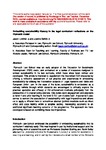Embedding sustainability literacy in the legal curriculum: reflections on the Plymouth model
| dc.contributor.author | Lowther, Jason | |
| dc.contributor.author | Sellick, J | |
| dc.date.accessioned | 2017-08-08T14:33:38Z | |
| dc.date.issued | 2016-09 | |
| dc.identifier.issn | 0306-9400 | |
| dc.identifier.issn | 1943-0353 | |
| dc.identifier.uri | http://hdl.handle.net/10026.1/9704 | |
| dc.description | peerreview_statement: The publishing and review policy for this title is described in its Aims & Scope. aims_and_scope_url: http://www.tandfonline.com/action/journalInformation?show=aimsScope&journalCode=ralt20 | |
| dc.description.abstract |
Plymouth Law School was an early adopter of the Education for Sustainable Development (ESD) credo, and embarked on a series of measures designed to embed sustainability in its law curricula, which have since been refined and developed. This article is intended to supplement the theoretical ESD discourse by offering a reflective assessment of our practice and experiences in embedding sustainability by utilising the Foundation subjects of Legal Systems and Skills and European Union Law. In the case of the latter, sustainability is embedded as a delivery vehicle through which students are encouraged to critically explore the practical operation and efficacy of EU enforcement methods, principally from the perspective of EU water policy and law. This builds upon engagement and exposure at level 4 and prior learning in the level 5 EU Law module itself. Importantly it also serves to cement the association of sustainability with legal imperatives and allows us to apply a different lens to sometimes abstract judicial creations such as direct effect and state liability within a tangible setting. Developing autonomy is an additional significant learning outcome of the programme. The approach we have developed is based on combining these two imperatives. | |
| dc.format.extent | 307-320 | |
| dc.language | en | |
| dc.language.iso | en | |
| dc.publisher | Informa UK Limited | |
| dc.subject | 4 Quality Education | |
| dc.title | Embedding sustainability literacy in the legal curriculum: reflections on the Plymouth model | |
| dc.type | journal-article | |
| dc.type | Journal Article | |
| plymouth.issue | 3 | |
| plymouth.volume | 50 | |
| plymouth.publication-status | Published | |
| plymouth.journal | The Law Teacher | |
| dc.identifier.doi | 10.1080/03069400.2016.1240919 | |
| plymouth.organisational-group | /Plymouth | |
| plymouth.organisational-group | /Plymouth/Faculty of Arts, Humanities and Business | |
| plymouth.organisational-group | /Plymouth/Faculty of Arts, Humanities and Business/School of Society and Culture | |
| plymouth.organisational-group | /Plymouth/REF 2021 Researchers by UoA | |
| plymouth.organisational-group | /Plymouth/REF 2021 Researchers by UoA/UoA18 Law | |
| plymouth.organisational-group | /Plymouth/Research Groups | |
| plymouth.organisational-group | /Plymouth/Research Groups/Marine Institute | |
| plymouth.organisational-group | /Plymouth/Users by role | |
| plymouth.organisational-group | /Plymouth/Users by role/Academics | |
| dcterms.dateAccepted | 2016-05-01 | |
| dc.rights.embargodate | 2018-6-20 | |
| dc.identifier.eissn | 1943-0353 | |
| dc.rights.embargoperiod | Not known | |
| rioxxterms.versionofrecord | 10.1080/03069400.2016.1240919 | |
| rioxxterms.licenseref.uri | http://www.rioxx.net/licenses/all-rights-reserved | |
| rioxxterms.licenseref.startdate | 2016-09 | |
| rioxxterms.type | Journal Article/Review |


